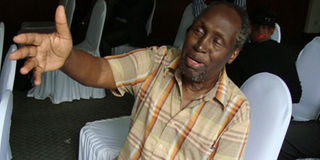Is a meeting of all world literatures really possible?

PHOTO | HUGHOLIN KIMARO | FILE Prof Ngugi wa Thiong’o.
What you need to know:
- Globalectics is the global plus the dialectics. Or the global and the dialects
- Ngugi, like many idealists, would wish us to believe that there are still possibilities for the goodness in some women and men to make the world accommodate humanity in all its shades, tongues, beliefs, idiosyncrasies etc
Cosmopolitans always live on the positive end of the street called “Humanity”. They argue that all humans have the potential for friendliness and love. So, cosmopolitans will say that the meeting of humans shall start from a meeting of the dialects in which women and men communicate. They shall preach the message of a global congress of dialects.
This supposed meeting of different tongues, as some form of communion of peoples of the world, is the subject of Ngugi wa Thiong’o’s latest book, Globalectics: Theory and the Politics of Knowing. Globalectics is the global plus the dialectics. Or the global and the dialects. For there is no dialectics without the dialects. But what does Ngugi mean by or wish us to learn from this conjunction of the global and the dialects or dialectics?
Ngugi’s premise here, which those who are familiar with his earlier argument in Moving the Centre is that literature has universal values and that a meeting of world literatures would lead to a better understanding of humanity; or lead to some kind of egalitarianism in the relationship, say, between the global North and South or between the (former) coloniser and the colonised or between Africa and the rest of the world.
What’s Ngugi’s definition of “globalectics”? He writes, “Globalectics embraces wholeness, interconnectedness, equality of potentiality of parts, tension and motion. It is a way of thinking and relating to the world, particularly in the era of globalism and globalisation.”
Ngugi, like many idealists, would wish us to believe that there are still possibilities for the goodness in some women and men to make the world accommodate humanity in all its shades, tongues, beliefs, idiosyncrasies etc.
The way Ngugi pushes this proposition is to argue that “… a theory from a colony (Kenya) could arise and find life in engagement” elsewhere in the world. The theory in question is the rise of the argument about the replacement of the English Department with the Department of Literature at the University of Nairobi in the 1960s. The subsequent enthronement of oral literature and other literatures from the rest of the world, especially the then formerly colonised countries was indeed a revolutionary undertaking in an African university.
But what were the consequences of this radical shift in the study of literature at the University of Nairobi and many other African universities where it became sacrilegious to talk about the Department of English? To stretch the question, what is the status of African Studies in universities in the rest of the world? Or, why didn’t most departments of literature shift towards Cultural Studies, which was exactly the motivation behind the call for literary egalitarianism?
Ngugi himself provides some answers to these questions, which you may find if you read the rest of Globalectics. I do not agree with some of his suggestions in the book and hence I would like to ask just three questions about the value of the kind of theorisation behind Ngugi’s globalectics.
THE PREJUDICES
First, if the new Department of Literature at the University of Nairobi was a harbinger of aesthetic liberation in Kenya, how is it that it could not deal with the contradictions of prejudice against popular literature/culture? Why is it that the same department couldn’t teach cultural studies? Ngugi is reknown for preaching the gospel of writing in African languages. I suppose he would have subscribed to teaching in/of African languages. To date, there is no course in African languages and literature in African languages (except Kiswahili) at the University of Nairobi. So, how do we realise globalectics locally?
Secondly, do departments of African Studies/Area Studies in the rest of the world really matter? And if they do matter, to whom do they matter? Isn’t it that most of these departments were/are mere sources of information for the host countries? What exactly is the value of teaching Gikuyu or Swahili literature at a university in Tokyo? Isn’t it really just for future reference by marketers of Western products or military operatives or data gatherers from those countries?
Thirdly, the most worrying reality of the aftermath of the much celebrated literary revolution is that one would have expected the subsequent scholarship to embrace cultural studies. One would have imagined that a globalectics that involved a ‘multi-logue’ of artforms – film, music, dance, theatre, painting etc – would have thrived.
That hardly happened. Literature remained the central reference points. To date one is unlikely to write a PhD thesis, say, on ‘emergent politics of identity in Nairobi Eastlands as reflected in the Matatu space’ in many departments of literature in Kenyan universities. Why? Because one will be asked: what is literary in Matatus?
See, the question isn’t: what is cultural about Matatus? If the broader category of culture had been embraced during the literary revolution, then we would probably be talking convincingly so about the rise of a cultural/literary theory from the (post)colonial margins to the global meeting point of dialectics.
So, although in Globalectics Ngugi stridently preaches for a celebration of ‘world literature’, I remain suspicious that there are just too many obstacles in the path of those who seek a universal congress of the arts. For, wouldn’t art itself rebel against such homogenisation? Still, would one teach, read, study, or recommend any literature from anywhere/everywhere in the world?
The writer teaches literature at the University of Nairobi and is a researcher with Native Intelligence Trust




